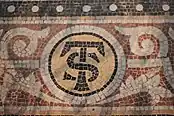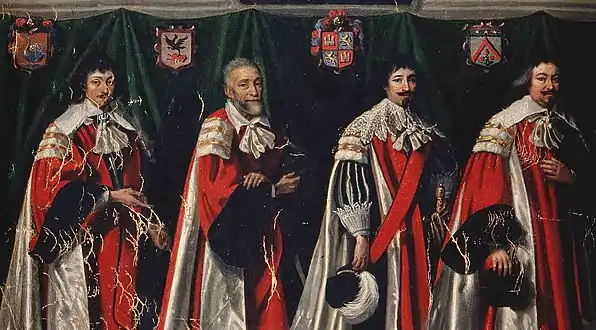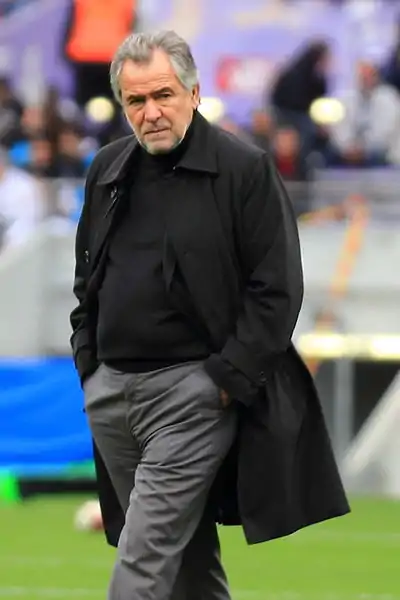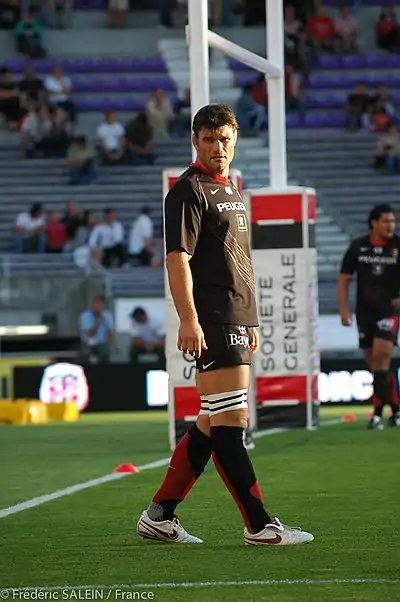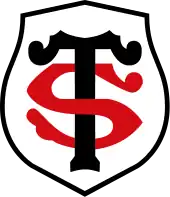 | |||
| Full name | Stade Toulousain | ||
|---|---|---|---|
| Nickname(s) | Le Stade Les Rouge et Noir (The Red and Blacks) | ||
| Founded | 1907 | ||
| Location | Toulouse, France | ||
| Ground(s) | Stade Ernest-Wallon (Capacity: 19,500) | ||
| President | Didier Lacroix | ||
| Coach(es) | Ugo Mola | ||
| Captain(s) | Julien Marchand | ||
| Most appearances | Jean Bouilhou (392) | ||
| Top scorer | Jean-Baptiste Élissalde (1,776) | ||
| Most tries | Vincent Clerc (134) | ||
| League(s) | Top 14 | ||
| 2022–23 | 1st | ||
| |||
| Official website | |||
| www | |||
Stade Toulousain (French pronunciation: [stad tuluzɛ̃]) (Occitan: Estadi Tolosenc), also referred to as Toulouse, is a professional rugby union club based in Toulouse, France. They compete in the Top 14, France's top division of rugby, and the European Rugby Champions Cup.
Toulouse is the most successful club in Europe, having won the Heineken Cup/European Rugby Champions Cup a record five times – in 1996, 2003, 2005, 2010 and 2021. They were also runners-up in 2004 and 2008 against London Wasps and Munster, respectively. Stade Toulousain have also won a record 22 Boucliers de Brennus, the French domestic league trophy. It is traditionally one of the main providers for the French national team and its youth academy is one of the best in the world. Stade Toulousain also have the biggest fan base in Europe, and the biggest social media and brand presence of any non-national rugby team across both league and union.
Their home ground is the Stade Ernest-Wallon. However, big Top 14 matches along with European games are often played at the Stadium Municipal de Toulouse. The club colours are red, black and white.
History
Roots and foundation
Before 1907, rugby union in Toulouse was only played in schools or universities. In 1893, students of secondary school "Lycée de Toulouse" got together in a new team "Les Sans-Soucis". Once attending university, the same students founded "l'Olympique Toulousain", which became "Stade Olympien des Étudiants de Toulouse" (SOET) a few years later in 1896. In the same period, 'non-students' grouped in "le Sport Athlétique Toulousain" (SAT) while students of the veterinary school created "l'Union Sportive de l'École Vétérinaire" (USEV). Both entities merged in 1905 and called themselves "Véto-Sport". Finally in 1907, Stade Toulousain was founded resulting from a union between the SOET and Véto-Sport.
Since its creation in 1907, Stade Toulousain drew on the past of the city. The design of Stade Toulousain's crest refers to the initials of Thomas Aquinas (transl. Saint Thomas in French ; S and T, same as the club's name) whose bones rest in the Church of the Jacobins, in Toulouse. The interlaced letters came from a famous tiled floor of the Basilica of Saint-Sernin, where the relics were temporarily moved for almost two centuries after the French Revolution.[1] The historical colours, red and black, are rooted in the ceremonial costume of the capitouls of Toulouse. A municipal body created in 1147, the capitouls were until the French Revolution the consuls of the city. Their traditional costume was red and black (with white bands), as shown in the oldest portraits dating from the 14th century.[2]
Early years
%252C_le_Stade_toulousain_Champion_de_France_pour_la_cinqui%C3%A8me_fois_en_six_ans.jpg.webp)
Stade Toulousain played its first final of the national title French Championship in 1909 and lost it to Stade Bordelais Université Club (17–0) in Toulouse. In 1912 Stade Toulousain won its first national title. It had to wait until 1922 before it won its second. However the 1920s were a golden era for the club. Their first final action in the 1920s was in 1921, when they were defeated by USA Perpignan. Despite losing in 1921, the side went on to win the 1922, 1923, 1924, 1926 and 1927 championships.
1930s to 1950s
The following decades were relatively quiet after such a dominant era during the 1920s. Stade Toulousain would not make it to any grand finals during the 1930s, and it would not be until the late 1940s when they would return. However they did contest the Challenge Yves du Manoir with RC Toulon in 1934, though it ended in a nil-all tie and both teams were winners. The club made it to the final of the 1947 championship, and claimed the premiership, beating SU Agen, 10 to 3. However, no such championships followed, the club was again relatively quiet on the championship. It was 22 years in the waiting; Toulouse made it to the final, but were defeated by the CA Bègles club.
1970s to 1980s
In 1971 Toulouse contested the Challenge Yves du Manoir against US Dax, losing 18 to 8. Eleven years after the CA Bègles defeat, the club was again disappointed in the final, being defeated by AS Béziers in the championship game of 1980. The latter end of the decade was however, reminiscent of the 1920s sides. Toulouse were again contesting the Challenge Yves du Manoir for the 1984 season, though they lost to RC Narbonne 17 to 3. They did however claim their first championship since 1947, defeating RC Toulon in the 1985 final. The following season saw them successfully defend their championship, defeating SU Agen in the final. After a number of defeats in the Challenge Yves du Manoir finals, Toulouse defeated US Dax to win the 1988 competition. Both Toulon and Agen won the following premierships (1987 and 1988) but Toulouse won another championship in 1989.
1990s to present
The dominance continued in the 1990s, starting with a grand final loss in 1991, and a Challenge Yves du Manoir championship in 1993, defeating Castres 13 to 8 in the final. The mid-1990s saw Stade Toulousain become a major force yet again, as the club claimed four premierships in a row, winning the championship in 1994, 1995, 1996 and 1997, as well as the Challenge Yves du Manoir in 1995. The club emulated its success in the European Rugby Cup, becoming the first ever champions in the 1995–96 season.

The late 1990s and the 2000s saw the club again reach great heights. The club won the Challenge Yves du Manoir in 1998, defeating Stade Français Paris, the 1999 championship as well as the 2001 championship. They also were runners-up in the 2003 season, losing to Stade Français in the final. As the club had done in the mid-1990s, Stade Toulousain replicated this success in the European Rugby Cup, winning the 2002–03 and the 2004–05 cups. The club made it to the final of the 2005-06 Top 14, and despite only trailing Biarritz 9–6 at half time, Toulouse could not prevent a second-half whitewash, eventually going down 40–13. They ended their seven-year title drought with a 26–20 win over ASM Clermont Auvergne on 28 June 2008. In 2008 they narrowly lost a Heineken Cup Final to Munster by 3 points. In 2010 Toulouse defeated Leinster to reach the final where they faced Biarritz Olympique at Stade de France in Paris on Saturday 22 May 2010. Toulouse won the game by 21–19 to claim their fourth Heineken Cup title,[3][4] making them the first club to win the title four times. Stade Toulousain is also the only French club to have taken part in all the editions of Heineken Cup since its creation (17, with the 2011–12 season). They won the French championship in 2011 against Montpellier (15–10) and 2012 against Toulon (18–12). Stade Toulousain reached the semi-finals of the French championship 20 consecutive years (from 1994 to 2013). In 2019, Toulouse came back to victory, earning a 20th French Rugby Union Championship title before making an historic double, winning the 2021 Champions Cup and the 2021 Top 14. Their latest title is the 2023 French championship earned against La Rochelle, teams were ranked respectively first and second of the regular season 2023.
Stadium
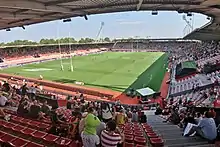
Toulouse play their home games at the Stade Ernest-Wallon, which was built in the late 1980s and was recently renovated. It has a capacity of 19,500. Stade Toulousain is one of the rare teams, in France and especially in rugby union, that own its stadium. Since February 2020, it has also been home to rugby league team Toulouse Olympique, which currently competes in the 2nd tier Championship, following negotiations and an agreement between both executive boards.[5]
The stadium however cannot always accommodate all the fans of the Toulouse club. For the larger fixtures, such as championship or Heineken Cup games or play-offs, the fixture may be moved to Stadium Municipal, which has more capacity, 33,150. The stadium was used for numerous matches at the 2007 Rugby World Cup and will host the 2023 Rugby World Cup.[6]
Honours

- Heineken Cup/European Rugby Champions Cup
- French Champions:
- Challenge Yves du Manoir:
- Champions (4): 1934, 1988, 1993, 1995
- Runners-up (2): 1971, 1984
- French Cup:
- Champions (4): 1946, 1947, 1984, 1998
- Runners-up (2): 1949, 1985
- Toulouse Masters:
- Champions (2): 1986, 1990
European record

- Toulouse qualified for the Heineken Cup in every season of that competition's existence (1995–96 to 2013–14), and played in the inaugural season of the replacement competition, the European Rugby Champions Cup.
- The club have the best competition record in the Heineken Cup/European Rugby Champions Cup, having won the competition five times and having played seven finals, and was the first team to win over 100 games in the history of the competition. Along with Munster, Toulouse is the most victorious team in the history of the competition, with a total of 124 wins. It's the second best club in European rugby in terms of total games played in the highest European competition possible with 179 games alongside Leinster and behind Munster.
- Stade toulousain completed "the Double" (Heineken Cup/European Rugby Champions Cup-National Championship) 2 times (1995-1996 and 2020-2021), a record shared with Leicester Tigers (2000-2001 and 2001-2002) and Saracens (2015-2016 and 2018-2019).
- Vincent Clerc is the second all-time top try scorer in Heineken Cup/European Rugby Champions Cup history, having scored 36 units.
| Season | Competition | Games | Points | Notes | |||||
|---|---|---|---|---|---|---|---|---|---|
| played | won | drawn | lost | for | against | difference | |||
| 2021-22 | European Rugby Champions Cup | 4 | 1 | 1 | 2 | 61 | 65 | -4 | Semi-finalists (lost to Leinster) |
| 2020-21 | European Rugby Champions Cup | 6 | 6 | 0 | 0 | 161 | 93 | +68 | Champions (defeated La Rochelle) |
| 2019–20 | European Rugby Champions Cup | 8 | 7 | 0 | 1 | 216 | 121 | +95 | Semi-finalists (lost to Exeter Chiefs) |
| 2018–19 | European Rugby Champions Cup | 8 | 6 | 0 | 2 | 183 | 187 | -4 | Semi-finalists (lost to Leinster) |
| 2017–18 | did not Qualify | ||||||||
| 2016–17 | European Rugby Champions Cup | 7 | 3 | 0 | 6 | 180 | 132 | +48 | Quarter-finalists (lost to Munster) |
| 2015–16 | European Rugby Champions Cup | 6 | 1 | 0 | 5 | 85 | 173 | -88 | Failed to exit group stages from Pool 1. |
| 2014–15 | European Rugby Champions Cup | 6 | 4 | 0 | 2 | 126 | 124 | +2 | Failed to exit group stages from Pool 4. |
| 2013–14 | Heineken Cup | 7 | 5 | 0 | 2 | 166 | 110 | 56 | Quarter-finalists (lost to Munster) |
| 2012–13 | Heineken Cup | 6 | 4 | 0 | 2 | 132 | 84 | 48 | Second place in Pool 2; parachuted into European Challenge Cup |
| European Challenge Cup | 1 | 0 | 0 | 1 | 19 | 30 | −11 | Quarter-finalists (lost to Perpignan) | |
| 2011–12 | Heineken Cup | 7 | 4 | 0 | 3 | 164 | 124 | 40 | Quarter-finalists (lost to Edinburgh) |
| 2010–11 | Heineken Cup | 8 | 6 | 0 | 2 | 205 | 137 | 68 | Semi-finalists (lost to Leinster) |
| 2009–10 | Heineken Cup | 9 | 8 | 0 | 1 | 232 | 143 | 89 | Champions (defeated Biarritz Olympique) |
| 2008–09 | Heineken Cup | 7 | 4 | 1 | 2 | 127 | 97 | 30 | Quarter-finalists (lost to Cardiff Blues) |
| 2007–08 | Heineken Cup | 9 | 6 | 0 | 3 | 210 | 119 | 91 | Runners-up (lost to Munster) |
| 2006–07 | Heineken Cup | 6 | 3 | 0 | 3 | 147 | 145 | 2 | Failed to exit group stages from Pool 5. |
| 2005–06 | Heineken Cup | 7 | 5 | 1 | 1 | 223 | 165 | 58 | Quarter-finalists (lost to Leinster) |
| 2004–05 | Heineken Cup | 9 | 8 | 0 | 1 | 263 | 144 | 119 | Champions (defeated Stade Français) |
| 2003–04 | Heineken Cup | 9 | 7 | 0 | 2 | 232 | 113 | 119 | Runners-up (lost to Wasps) |
| 2002–03 | Heineken Cup | 9 | 8 | 0 | 1 | 308 | 163 | 145 | Champions (defeated Perpignan) |
| 2001–02 | Heineken Cup | 6 | 3 | 0 | 3 | 151 | 146 | 5 | Failed to exit group stages from Pool 6. |
| 2000–01 | Heineken Cup | 6 | 2 | 1 | 3 | 171 | 182 | −11 | Failed to exit group stages from Pool 3. |
| 1999–00 | Heineken Cup | 8 | 6 | 0 | 2 | 256 | 122 | 134 | Semi-finalists (lost to Munster) |
| 1998–99 | Heineken Cup | 7 | 4 | 0 | 3 | 247 | 118 | 129 | Quarter-finalists (lost to Ulster) |
| 1997–98 | Heineken Cup | 8 | 6 | 1 | 1 | 273 | 153 | 120 | Semi-finalists (lost to Brive) |
| 1996–97 | Heineken Cup | 6 | 4 | 0 | 2 | 194 | 197 | −3 | Semi-finalists (lost to Leicester Tigers) |
| 1995–96 | Heineken Cup | 4 | 4 | 0 | 0 | 123 | 40 | 83 | Champions (defeated Cardiff) |
Current standings
| |||||||||||||||
| Club | Played | Won | Drawn | Lost | Points For | Points Against | Points Diff. | Try Bonus | Losing Bonus | Points | |||||
|---|---|---|---|---|---|---|---|---|---|---|---|---|---|---|---|
| 1 | Racing | 12 | 8 | 0 | 4 | 352 | 223 | +129 | 4 | 4 | 40 | ||||
| 2 | Bordeaux Bègles | 12 | 8 | 0 | 4 | 330 | 263 | +67 | 2 | 2 | 36 | ||||
| 3 | Stade Français | 12 | 7 | 1 | 4 | 238 | 199 | +39 | 2 | 1 | 33 | ||||
| 4 | Toulouse | 12 | 7 | 0 | 5 | 297 | 243 | +54 | 3 | 1 | 32 | ||||
| 5 | Toulon | 12 | 7 | 0 | 5 | 305 | 238 | +67 | 2 | 2 | 32 | ||||
| 6 | Pau | 12 | 7 | 0 | 5 | 268 | 246 | +22 | 2 | 1 | 31 | ||||
| 7 | Castres | 12 | 6 | 0 | 6 | 309 | 281 | +28 | 3 | 3 | 30 | ||||
| 8 | La Rochelle | 12 | 6 | 0 | 6 | 260 | 217 | +43 | 2 | 4 | 30 | ||||
| 9 | Clermont | 12 | 5 | 1 | 6 | 274 | 287 | –13 | 2 | 2 | 26 | ||||
| 10 | Bayonne | 12 | 5 | 0 | 7 | 243 | 290 | -47 | 1 | 3 | 24 | ||||
| 11 | Perpignan | 12 | 5 | 0 | 7 | 246 | 362 | –116 | 1 | 0 | 21 | ||||
| 12 | Oyonnax | 12 | 5 | 0 | 7 | 255 | 345 | -90 | 0 | 0 | 20 | ||||
| 13 | Lyon | 12 | 4 | 0 | 8 | 250 | 375 | –125 | 2 | 2 | 20 | ||||
| 14 | Montpellier | 12 | 3 | 0 | 9 | 225 | 283 | –58 | 0 | 4 | 16 | ||||
|
If teams are level at any stage, tiebreakers are applied in the following order:
| |||||||||||||||
| Green background (rows 1 and 2) receive semi-final play-off places and receive berths in the 2024–25 European Rugby Champions Cup. Blue background (rows 3 to 6) receive quarter-final play-off places, and receive berths in the Champions Cup. Plain background indicates teams that earn a place in the 2024–25 European Rugby Challenge Cup. Pink background (row 13) will be contest a play-off with the runners-up of the 2023–24 Rugby Pro D2 season for a place in the 2024–25 Top 14 season. Red background (row 14) will be relegated to Rugby Pro D2. Updated: 7 January 2024 | |||||||||||||||
Selected presidents
- Ernest Wallon: 1907–12
- Charles Audry: 1912–30
- Louis Puech: 1944–51
- Jean Fabre: 1980–90
- René Bouscatel: 1992–2017
- Didier Lacroix: 2017-
Bouscatel is the most successful president in the history of the club.
Selected former coaches
_-_53Fi4599.jpg.webp)
.svg.png.webp) Tom "Rusty" Richards: 1913 (as player/manager)
Tom "Rusty" Richards: 1913 (as player/manager) François Borde: 1928-30, 1934-38
François Borde: 1928-30, 1934-38 Roger Piteu: 1945-49
Roger Piteu: 1945-49 Claude Labatut: 1971-76, 1976-80
Claude Labatut: 1971-76, 1976-80 Robert Bru: 1980-83
Robert Bru: 1980-83 Pierre Villepreux: 1982-89 (coached along with Skrela between 1983 and 1989)
Pierre Villepreux: 1982-89 (coached along with Skrela between 1983 and 1989) Jean-Claude Skrela: 1983-92 (coached along with Villepreux between 1983 and 1989)
Jean-Claude Skrela: 1983-92 (coached along with Villepreux between 1983 and 1989) Guy Novès: 1988-90 (as assistant coach), 1993-2015
Guy Novès: 1988-90 (as assistant coach), 1993-2015 Ugo Mola: 2015-
Ugo Mola: 2015-
Current squad
The Toulouse squad for the 2023–24 season is:[7]
Note: Flags indicate national union under World Rugby eligibility rules. Players may hold more than one non-World Rugby nationality.
Espoirs squad
Note: Flags indicate national union under World Rugby eligibility rules. Players may hold more than one non-World Rugby nationality.
|
|
Out on loan
- As of 1 July 2022[8]
Note: Flags indicate national union under World Rugby eligibility rules. Players may hold more than one non-World Rugby nationality.
|
Notable former players
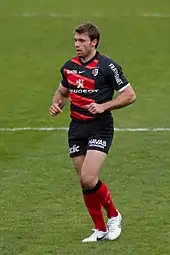
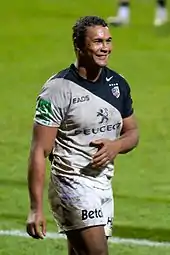

The following are players who have represented their country, players who have won a title with the club, players who have played a sufficient number of games to go down in the club history or players who came from the academy and have made a significant career in another team:
 Patricio Albacete
Patricio Albacete Omar Hasan
Omar Hasan Nicolás Vergallo
Nicolás Vergallo Alberto Vernet Basualdo
Alberto Vernet Basualdo.svg.png.webp) Rory Arnold
Rory Arnold.svg.png.webp) Luke Burgess
Luke Burgess.svg.png.webp) Tala Gray
Tala Gray.svg.png.webp) Tom Richards
Tom Richards Rob Andrew
Rob Andrew Toby Flood
Toby Flood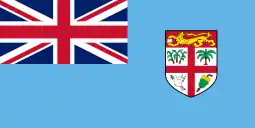 Rupeni Caucaunibuca
Rupeni Caucaunibuca Vilimoni Delasau
Vilimoni Delasau Semi Kunatani
Semi Kunatani Maleli Kunavore
Maleli Kunavore Timoci Matanavou
Timoci Matanavou Akapusi Qera
Akapusi Qera David Aucagne
David Aucagne Benoît Baby
Benoît Baby Jean Bayard
Jean Bayard Lionel Beauxis
Lionel Beauxis Franck Belot
Franck Belot Nicolas Bézy
Nicolas Bézy Sébastien Bézy
Sébastien Bézy Alexandre Bioussa
Alexandre Bioussa Jean-Marie Bonal
Jean-Marie Bonal Eric Bonneval
Eric Bonneval Jean Bouilhou
Jean Bouilhou François Borde
François Borde Guillaume Boussès
Guillaume Boussès Yannick Bru
Yannick Bru Jean-Marie Cadieu
Jean-Marie Cadieu Christian Califano
Christian Califano Yacouba Camara
Yacouba Camara Philippe Carbonneau
Philippe Carbonneau Thomas Castaignède
Thomas Castaignède Richard Castel
Richard Castel Jérôme Cazalbou
Jérôme Cazalbou Denis Charvet
Denis Charvet André Chilo
André Chilo Albert Cigagna
Albert Cigagna Vincent Clerc
Vincent Clerc Didier Codorniou
Didier Codorniou Patrice Collazo
Patrice Collazo Cédric Desbrosse
Cédric Desbrosse Yann Delaigue
Yann Delaigue Yann David
Yann David Christophe Deylaud
Christophe Deylaud Yves Donguy
Yves Donguy Jean-Marc Doussain
Jean-Marc Doussain Sylvain Dupuy
Sylvain Dupuy Thierry Dusautoir
Thierry Dusautoir Jean-Baptiste Élissalde
Jean-Baptiste Élissalde Jean Fabre
Jean Fabre Gaël Fickou
Gaël Fickou Jérôme Fillol
Jérôme Fillol Florian Fritz
Florian Fritz Gillian Galan
Gillian Galan Henri Galau
Henri Galau Xavier Garbajosa
Xavier Garbajosa David Gérard
David Gérard Imanol Harinordoquy
Imanol Harinordoquy Dominique Harize
Dominique Harize Cédric Heymans
Cédric Heymans Yoann Huget
Yoann Huget Adolphe Jauréguy
Adolphe Jauréguy Yannick Jauzion
Yannick Jauzion Nicolas Jeanjean
Nicolas Jeanjean Christian Labit
Christian Labit Virgile Lacombe
Virgile Lacombe Serge Lairle
Serge Lairle Gregory Lamboley
Gregory Lamboley Benoît Lecouls
Benoît Lecouls Julien Le Devedec
Julien Le Devedec Matthieu Lièvremont
Matthieu Lièvremont Marcel-Frédéric Lubin-Lebrère
Marcel-Frédéric Lubin-Lebrère Yoann Maestri
Yoann Maestri Gérald Martinez
Gérald Martinez Alfred Mayssonnié
Alfred Mayssonnié Maxime Médard
Maxime Médard Maxime Mermoz
Maxime Mermoz Frédéric Michalak
Frédéric Michalak Romain Millo-Chluski
Romain Millo-Chluski Hugues Miorin
Hugues Miorin Ugo Mola
Ugo Mola Sylvain Nicolas
Sylvain Nicolas Guy Novès
Guy Novès Émile Ntamack
Émile Ntamack Yannick Nyanga
Yannick Nyanga Alexis Palisson
Alexis Palisson Fabien Pelous
Fabien Pelous Alain Penaud
Alain Penaud Louis Picamoles
Louis Picamoles Lucas Pointud
Lucas Pointud Clément Poitrenaud
Clément Poitrenaud Jean-Baptiste Poux
Jean-Baptiste Poux Jean-Pierre Rives
Jean-Pierre Rives Philippe Rougé-Thomas
Philippe Rougé-Thomas Daniel Santamans
Daniel Santamans William Servat
William Servat David Skrela
David Skrela Jean-Claude Skrela
Jean-Claude Skrela Cédric Soulette
Cédric Soulette Nicolas Spanghero
Nicolas Spanghero Walter Spanghero
Walter Spanghero Christopher Tolofua
Christopher Tolofua Franck Tournaire
Franck Tournaire Pierre Villepreux
Pierre Villepreux Jaba Bregvadze
Jaba Bregvadze Vasil Kakovin
Vasil Kakovin Leonardo Ghiraldini
Leonardo Ghiraldini Andrea Lo Cicero
Andrea Lo Cicero Salvatore Perugini
Salvatore Perugini Trevor Brennan
Trevor Brennan Aidan McCullen
Aidan McCullen Corey Flynn
Corey Flynn Hosea Gear
Hosea Gear Jerome Kaino
Jerome Kaino Byron Kelleher
Byron Kelleher Isitolo Maka
Isitolo Maka Luke McAlister
Luke McAlister Lee Stensness
Lee Stensness Neemia Tialata
Neemia Tialata Dragoș Dima
Dragoș Dima Gaffie du Toit
Gaffie du Toit Gary Botha
Gary Botha Daan Human
Daan Human Cheslin Kolbe
Cheslin Kolbe Shaun Sowerby
Shaun Sowerby Jano Vermaak
Jano Vermaak Gurthrö Steenkamp
Gurthrö Steenkamp Piula Faʻasalele
Piula Faʻasalele Census Johnston
Census Johnston Joe Tekori
Joe Tekori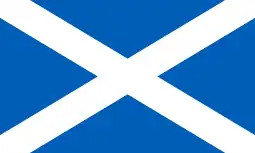 Richie Gray
Richie Gray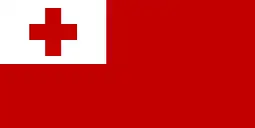 Edwin Maka
Edwin Maka Finau Maka
Finau Maka Stuart Krohn
Stuart Krohn Gareth Thomas
Gareth Thomas
Fans
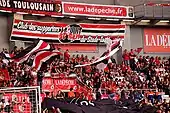
Being one of the most popular teams in France, Toulouse has many fan clubs all over the country:[9]

- Le Huit (fan club of Stade toulousain based in Toulouse)
- Le Huit Section Aveyron (branch based in Aveyron)
- Le Rouge et le Noir (formerly Les Ultras, the oldest fan club based in Toulouse).
- Le 16e homme (fan club of Stade toulousain based in Haute-Garonne)
- Le 16e homme Toulousains 2 Paris (branch based in Paris)
- L'amicale des Supporters (fan club of Stade toulousain based in Toulouse)
- Tolosa XV (fan club of Stade toulousain based in Haute-Garonne)
- Les Salopettes Rouges (fan club based in Tarn)
Toulouse supporters are known for being very active on social media. Stade Toulousain is the most followed rugby club on social media in the world, ahead Crusaders, Sharks, Toulon and Stormers.[10]
Stade Ernest-Wallon atmosphere is well known in France and Europe to be one of the best of club rugby. Toulouse can rely on a passionate city, having one of the best attendances in the league. The club's mascot, Ovalion, is a lion, animal which is the symbol of Peugeot, main sponsor of the club.[11]
See also
References
- ↑ "Saint-Thomas d'Aquin, protecteur du Stade toulousain". Grand-Sud Insolite (in French). Retrieved 6 June 2022.
- ↑ Hisbacq, Fabien (19 August 2021). "La question pas si bête : pourquoi le Stade Toulousain joue-t-il en rouge et noir ?". Actu.fr (in French). Retrieved 6 June 2022.
- ↑ Cleary, Mick (22 May 2010). "Toulouse lead French revolution with Heineken Cup final win against Biarritz". The Daily Telegraph. London. Archived from the original on 12 January 2022. Retrieved 24 May 2010.
- ↑ "Biarritz 19–21 Toulouse: As it happened". RTÉ Sport. Raidió Teilifís Éireann. 22 May 2010. Retrieved 24 May 2010.
- ↑ Assemat, Anthony (31 January 2020). "Toulouse. Pourquoi, au stade Ernest-Wallon, le Bleu et Blanc va remplacer le Rouge et Noir". Actu.fr (in French). Retrieved 6 June 2022.
- ↑ "The Rugby World Cup 2023 in Toulouse". Toulouse-Visit.com. 28 April 2022. Retrieved 6 June 2022.
- ↑ "Staff équipe Pro". Stade Toulousain (in French). Retrieved 8 July 2022.
- ↑ "Rugby transfers for Toulouse for 2022/2023". All.Rugby. Retrieved 8 July 2022.
- ↑ "Clubs de Supporters". Stade Toulousain (in French). Retrieved 6 June 2022.
- ↑ Dickins, Connor (24 May 2022). "Most Popular Rugby Clubs in the World". LastWordOnSports.com. Retrieved 6 June 2022.
- ↑ "Toulouse. L'Ovalion nouveau est arrivé". La Dépêche du Midi (in French). 7 May 2011. Retrieved 6 June 2022.
External links
- (in French) Stade Toulousain Official website
- Data, Results etc on ITS Rugby
